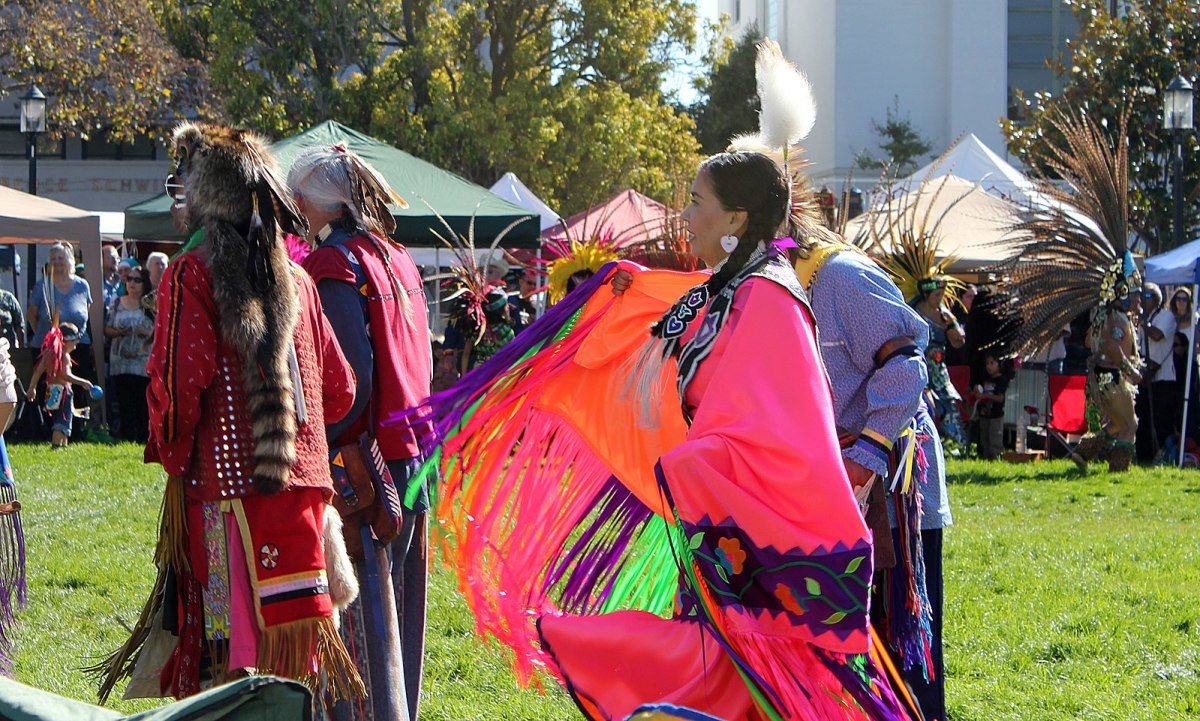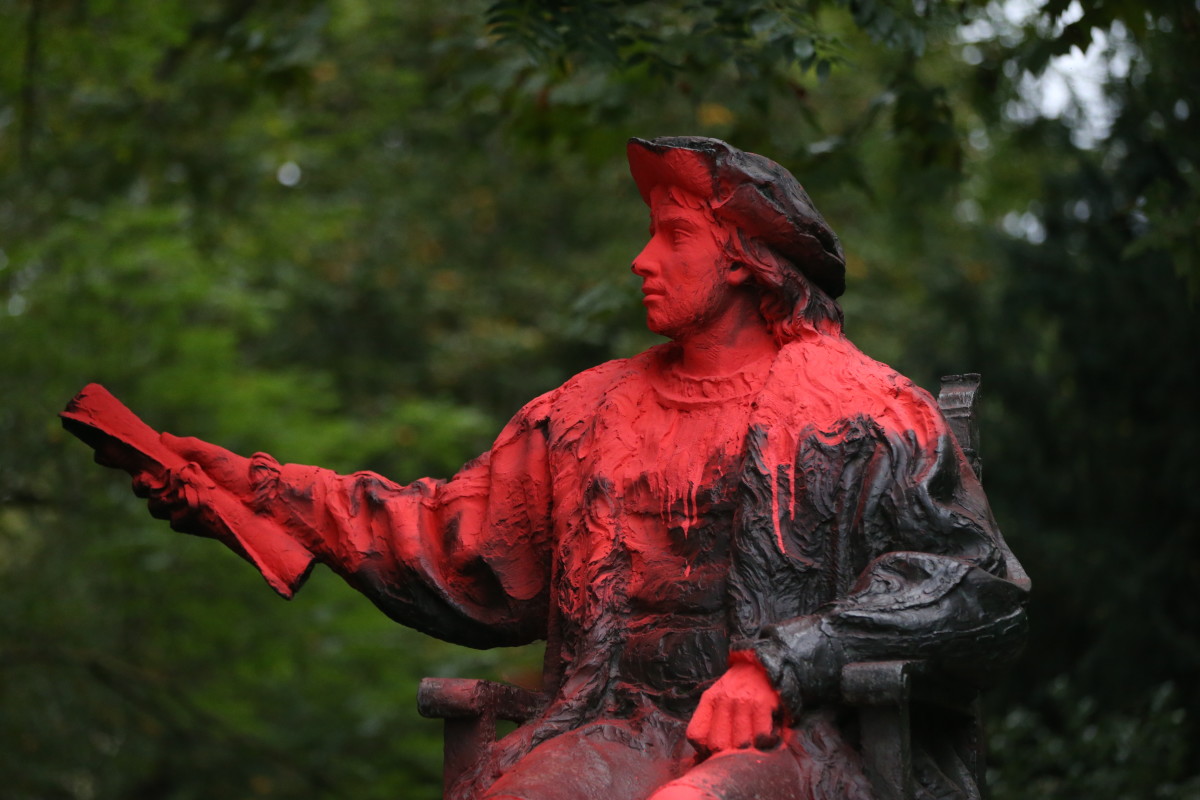
Fast facts:
- In 2024, Columbus Day, or Indigenous Peoples' Day, is recognized on Monday, October 14.
- This is a state holiday in some states but not others — see the table below for details.
- Most retail, convenience, and grocery stores will remain open, although most public institutions like the DMV, libraries, and courts will be closed.
- USPS will be closed and out of service for the day, but UPS and FedEx will be open and delivering.
- The NYSE and Nasdaq stock markets will be open, but the bond market will be closed.
In 2024, Columbus Day — alternatively known as Indigenous Peoples' Day — is observed on Monday, October 14th.
Columbus Day is a federal holiday that is celebrated on the second Monday in October each year, meaning the exact date of its observance can change year after year. Despite the fact that it is a federal holiday, not all states observe Columbus Day.
Indigenous Peoples' Day is also observed on the second Monday of October, but again, not all states recognize it, so knowing what's open, what's closed, and who needs to go to work on October 14th can be confusing.
Here's everything you need to know about the Columbus/Indigenous Peoples' Day in 2024:
Which states celebrate Columbus Day/Indigenous Peoples' Day?
Today, 16 states observe Columbus Day/Indigenous Peoples' Day as an official state holiday, which means that state offices, schools, and businesses are closed.
26 states don’t celebrate either holiday.
And two states — Colorado and Hawaii — chose to spotlight something entirely different on the day: Colorado celebrates Cabrini Day, dedicated to the life of humanitarian Frances Xavier Cabrini, while Hawaii observes Discoverers Day, in homage to the island’s Polynesian explorers.
States that observe Columbus Day/Indigenous Peoples' Day as a paid holiday
| State | Observes Columbus Day/Indigenous Peoples Day | Comments |
|---|---|---|
Alabama |
Yes |
|
Alaska |
No |
Renamed Indigenous Peoples Day (2015) |
Arizona |
Yes |
|
Arkansas |
No |
|
California |
No |
|
Colorado |
No |
Cabrini Day (2020) is considered a paid holiday |
Connecticut |
Yes |
|
Delaware |
No |
|
Washington, DC |
Yes |
Renamed Indigenous Peoples Day (2019) |
Florida |
No |
|
Georgia |
Yes |
|
Hawaii |
No |
Renamed Discovery Day; however, it's not a paid holiday |
Idaho |
Yes |
|
Illinois |
Yes |
|
Indiana |
Yes |
|
Iowa |
No |
|
Kansas |
No |
|
Kentucky |
No |
|
Louisiana |
No |
|
Maine |
Yes |
Renamed Indigenous Peoples Day (2019) |
Maryland |
Yes |
|
Massachusetts |
Yes |
|
Michigan |
No |
|
Minnesota |
No |
|
Mississippi |
No |
|
Missouri |
Yes |
|
Montana |
Yes |
|
Nebraska |
Yes |
|
Nevada |
No |
|
New Hampshire |
No |
|
New Jersey |
Yes |
|
New Mexico |
Yes |
Renamed Indigenous Peoples Day (2019) |
New York |
Yes |
|
North Carolina |
No |
|
North Dakota |
No |
|
Ohio |
Yes |
|
Oklahoma |
No |
|
Oregon |
No |
|
Pennsylvania |
Yes |
|
Rhode Island |
Yes |
|
South Carolina |
No |
|
South Dakota |
Yes |
Renamed Native Americans Day (1990) |
Tennessee |
No |
|
Texas |
No |
|
Utah |
Yes |
|
Vermont |
No |
|
Virginia |
Yes |
|
Washington |
No |
|
West Virginia |
Yes |
|
Wisconsin |
No |
|
Wyoming |
No |
Is Columbus Day/Indigenous Peoples' Day a federal holiday?
In 2022, President Joe Biden affirmed the federal proclamation on both Columbus Day and Indigenous Peoples' Day, calling on all Americans to “observe this day with appropriate ceremonies and activities” and directing that the U.S. flag be displayed on all public buildings.
Columbus Day is the official federal holiday. This means that all non-essential federal workers enjoy the day off as a paid holiday, and federal institutions, like the DMV, libraries, and courts, are closed.
Since there’s so much confusion surrounding what else is open and closed on the holiday, you might want to keep this list handy to keep track:

What’s open on Columbus Day/Indigenous Peoples' Day 2024?
In 2024, Columbus Day/Indigenous Peoples' Day falls on Monday, October 14:
Stock markets
Although Columbus Day is a federal holiday, stock exchanges like the New York Stock Exchange (NYSE) and the Nasdaq will remain open on October 14.
Related: What’s open & what’s closed on Labor Day 2024?
Some delivery services
Delivery services like UPS and FedEx will continue to pick up and deliver packages on Columbus Day, and their retail stores will also be open.
In addition, Amazon will continue to make deliveries on October 14.
(USPS, as a federal mail carrier, will not be delivering, nor will its offices be open.)
Most retailers
Major retail chains are laser-focused on profits, and as such, they’re usually only closed on Christmas and Thanksgiving. That means Target, Best Buy, Home Depot, Lowe's, and Costco will all be open on Monday, October 14.
More on history:
- History of Nike: Company timeline and facts
- What happened to 7 Up? How 'The Uncola' faded into obscurity
- History of Coca-Cola: Timeline and Facts
Grocery stores
Walmart, Kroger, and Trader Joe’s will also be open as usual on Monday, October 14.
Fast-food and convenience store chains
McDonald’s, Wendy’s, Starbucks, Subway, and Popeye’s will also be open on Columbus Day, as well as most chain convenience stores like 7-Eleven and CVS.
National parks
Even though it’s a federal holiday, the nation’s 63 parks will be open to the public on Columbus Day — and changing leaves and cooler temperatures across most of the country will make it an especially lovely time to visit.
Some banks
Certain banks, including Chase and M&T Bank, will remain open, while others, including Wells Fargo and Citibank, will be closed.
Related: Juneteenth: What's open & what's closed on America’s newest federal holiday
Small and local businesses
According to the Pew Research Center, Columbus Day “seems to be fading” as a widespread holiday, which means that most businesses will be open on October 14 — but you should call ahead before visiting to make sure.
What’s closed on Columbus Day/Indigenous Peoples' Day?
Since the Federal Reserve observes the Columbus Day holiday, the bond market is closed.
Some banks
Banks of all sizes, like Bank of America, Citibank, and Wells Fargo follow the Fed calendar, so their branches will be closed; however, other banks, like Chase and M&T Bank, will remain open.
USPS
Columbus Day is one of 11 federal holidays for the US Post Office, so don’t expect any USPS mail or packages to be delivered that day.
The bond market
The federal government's bond market will be closed on Columbus/Indigenous Peoples' Day, as it is a federal holiday.
What is Columbus Day? A short history
Columbus Day was originally designated to celebrate Christopher Columbus’ “discovery” of the Americas, as well as make amends for prejudicial treatment faced by Italian Americans in the 19th and 20th centuries.
The holiday was established by President Benjamin Harrison in 1892 in response to the lynching of a group of Italian Americans in New Orleans. At the time, New Orleans was home to more Italian immigrants than any other city in the South, but they were often not welcome.
At the outbreak of World War II, which pitted the Allies against Axis powers — including Fascist Italy — Italian Americans were considered “enemy aliens.” In the United States, more than 600,000 Americans of Italian descent faced travel restrictions, curfews, and forced relocations to internment camps, where some remained for years.
President Roosevelt lifted these restrictions on Columbus Day in 1942, and after lobbying efforts by Italian American groups like the Knights of Columbus, the date became an official federal holiday in 1971.
Columbus Day continues to be celebrated in areas with large Italian American populations, with parades in New York City and San Francisco drawing especially big crowds.
View the original article to see embedded media.
What is Indigenous Peoples' Day? A short history
But in recent years, the story of Columbus has been re-examined through a different lens, interpreting it as a particularly dark moment in history since the explorer’s efforts directly resulted in the mass exploitation and destruction of America’s native peoples.
Scholars point to the fact that Columbus wasn’t actually the first European to reach the New World (that distinction most likely goes to Leif Eriksson), and since millions of indigenous people were already living in the Americas when Columbus arrived, he wasn’t a “discoverer” but rather a “colonizer.”
According to Columbus’ personal diaries, after he landed on the Bahamian island of Guanahani on October 12, 1492, the native peoples he met with “willingly traded everything they owned” and “did not bear arms;” nonetheless, Columbus decided to enslave them, writing “they would make fine servants … with fifty men we could subjugate them all and make them do whatever we want.”
By the time Columbus returned to Spain in March 1493, he brought gold, spices, and slaves with him, fulfilling his personal quest for fame and fortune. But through his legacy, it is estimated that as much as 90% of America’s Indigenous populations, or 55 million people, perished by violence and diseases like measles, smallpox, and influenza.
So many people died, in fact, that researchers now believe that a mini-ice age took place in the late 1500s and 1600s, as land and vegetation abandoned by millions of farmers absorbed greater quantities of carbon dioxide, causing the planet to cool by 0.15 degrees Celsius.
In 1977, protestors across the country began raising awareness of the genocide caused by colonization, and by 1992, on the 500th anniversary of Columbus’ landfall, the city of Berkeley, Calif. declared October 12 as a “Day of Solidarity with Indigenous People.”
Other cities implemented similar measures; South Dakota became the first state to officially recognize the holiday (there, it’s called Native American Day), and other states are now either co-celebrating Indigenous Peoples' Day alongside Columbus Day or dropping Columbus Day altogether.
View the original article to see embedded media.
Related: Veteran fund manager sees world of pain coming for stocks







